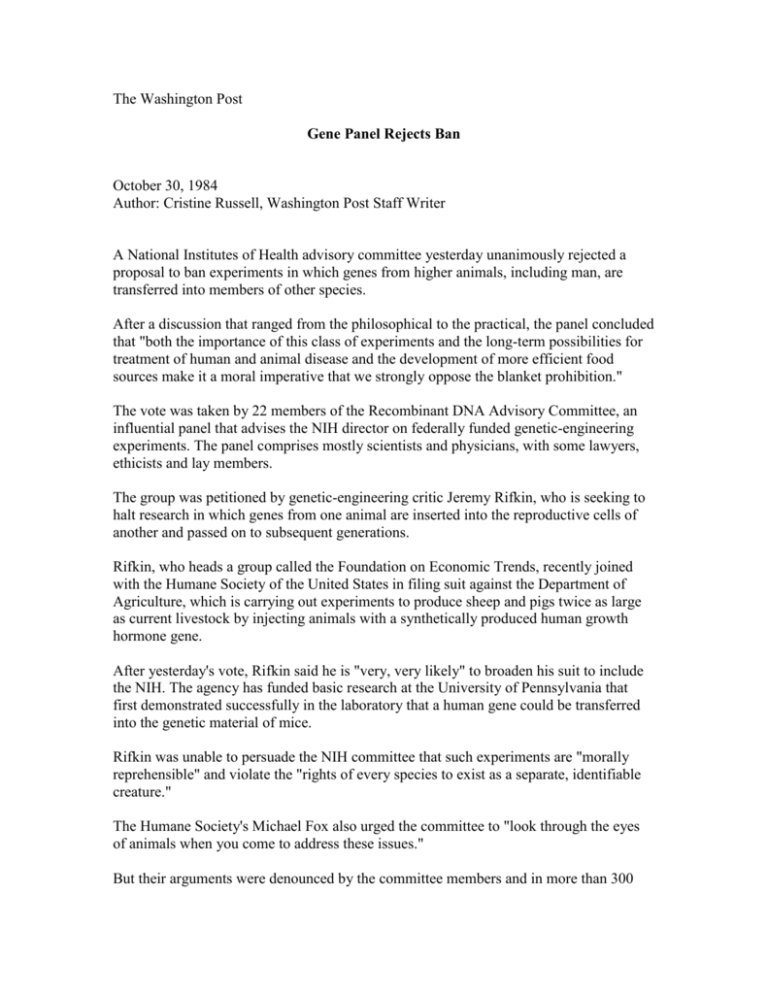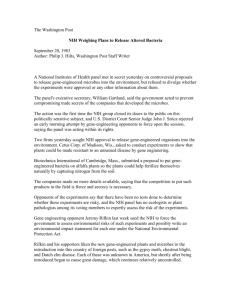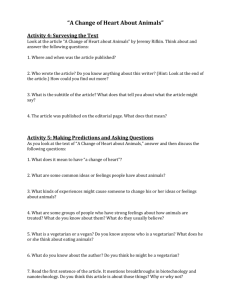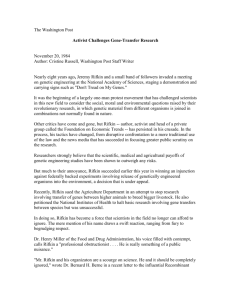Gene Panel Rejects Ban - The Foundation on Economic Trends
advertisement

The Washington Post Gene Panel Rejects Ban October 30, 1984 Author: Cristine Russell, Washington Post Staff Writer A National Institutes of Health advisory committee yesterday unanimously rejected a proposal to ban experiments in which genes from higher animals, including man, are transferred into members of other species. After a discussion that ranged from the philosophical to the practical, the panel concluded that "both the importance of this class of experiments and the long-term possibilities for treatment of human and animal disease and the development of more efficient food sources make it a moral imperative that we strongly oppose the blanket prohibition." The vote was taken by 22 members of the Recombinant DNA Advisory Committee, an influential panel that advises the NIH director on federally funded genetic-engineering experiments. The panel comprises mostly scientists and physicians, with some lawyers, ethicists and lay members. The group was petitioned by genetic-engineering critic Jeremy Rifkin, who is seeking to halt research in which genes from one animal are inserted into the reproductive cells of another and passed on to subsequent generations. Rifkin, who heads a group called the Foundation on Economic Trends, recently joined with the Humane Society of the United States in filing suit against the Department of Agriculture, which is carrying out experiments to produce sheep and pigs twice as large as current livestock by injecting animals with a synthetically produced human growth hormone gene. After yesterday's vote, Rifkin said he is "very, very likely" to broaden his suit to include the NIH. The agency has funded basic research at the University of Pennsylvania that first demonstrated successfully in the laboratory that a human gene could be transferred into the genetic material of mice. Rifkin was unable to persuade the NIH committee that such experiments are "morally reprehensible" and violate the "rights of every species to exist as a separate, identifiable creature." The Humane Society's Michael Fox also urged the committee to "look through the eyes of animals when you come to address these issues." But their arguments were denounced by the committee members and in more than 300 letters sent to the government from prominent scientists and professional groups, as well as the public. "There is an impressive body of evidence, almost all of which opposes Mr. Rifkin's notion," said Dr. Royston C. Clowes, a University of Texas biologist. He and others said it was particularly important for researchers to insert human genes into animals to be able to study crippling diseases and eventually to cure them. Dr. Susan Gottesman, a senior researcher at the National Cancer Institute who led the effort to defeat Rifkin's proposal, said it was "utter nonsense" to suggest that the experiments would "change a whole species . . . . We are not making sheep that tell jokes and laugh or people with bat wings." "I think the vast majority of the people in this country would come down extremely strongly on the side of using animals" for such research, she said. Gottesman and others did express concern about future experiments involving the manipulation of human "germ" or reproductive cells, but argued that such experiments would receive public scrutiny before they are attempted. Dr. Leroy Walters, head of the Kennedy Institute of Ethics, said he believes it will be five to 10 years before such experiments are attempted. He said it would be "premature" to make a decision on them now. Walters heads a subcommittee of the recombinant DNA panel that is drafting recommendations for human gene therapy involving attempts to cure genetic disease in one person without affecting genetic material passed on to future generations. The panel was told yesterday that the first experiments involving rare immune system deficiencies may be ready for review next year. Although Rifkin's attempt yesterday to have gene-transfer experiments banned was regarded by some scientists as a nuisance attack, his criticism is taken seriously. In another novel suit against the NIH earlier this year, he succeeded at least temporarily in stopping government-funded experiments involving the deliberate release into the environment of genetically engineered organisms such as microbes designed to help protect crops against frost. The NIH is appealing. Copyright (c) 1984 The Washington Post











